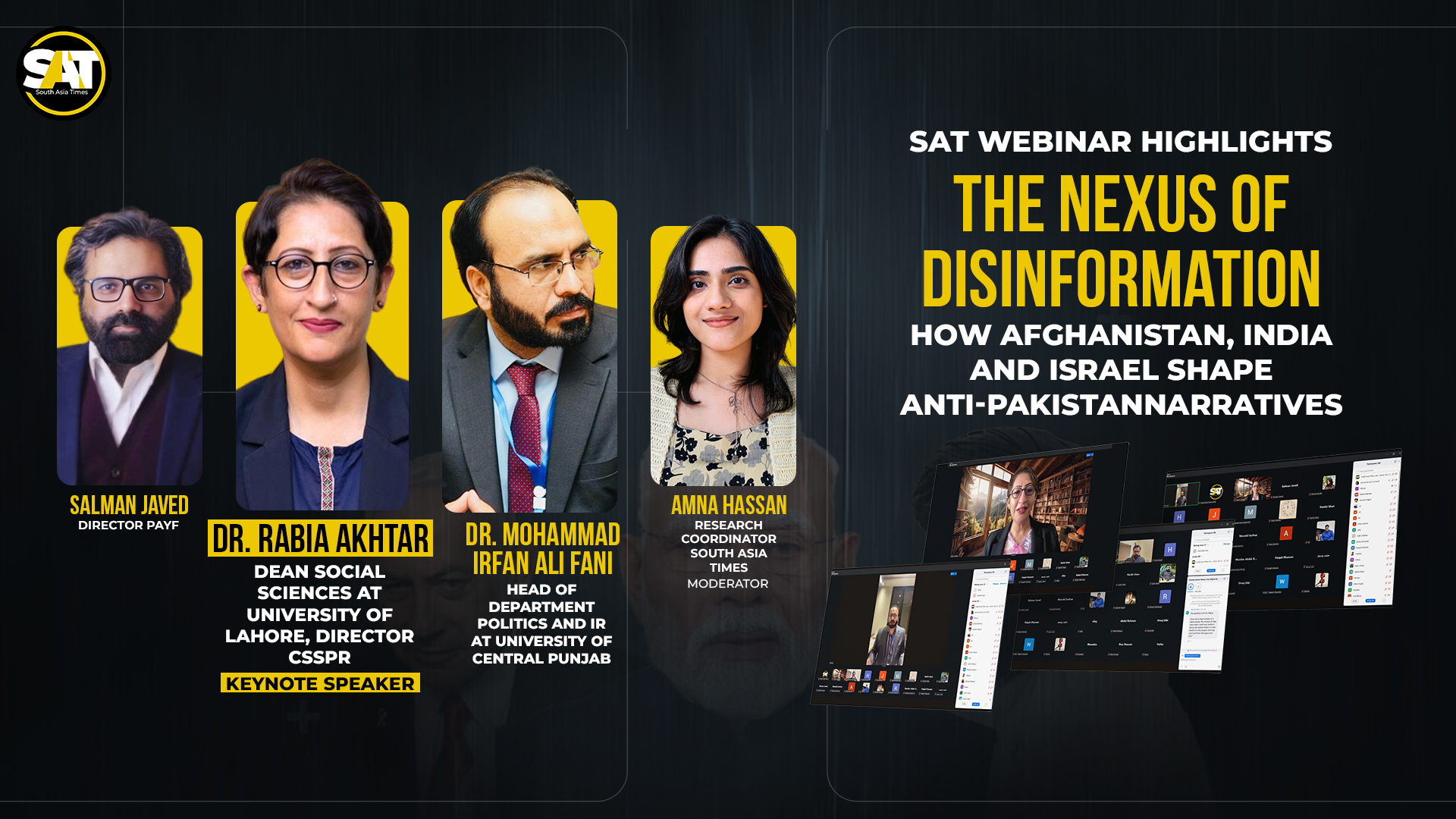
November 2025
On November 25, 2025, the South Asia Times (SAT) convened a high-level webinar titled “The Nexus of Disinformation” to address the growing threat of coordinated influence operations targeting Pakistan. Hosted by Amna Hassan, the session featured a comprehensive opening overview by Mr. Salman Javed, who laid the groundwork for expert analysis by distinguished guests Dr. Irfan Fani and Dr. Rabia Akhtar.
The central thesis of the discussion was that actors in Afghanistan, India, and Israel are no longer operating in isolation but are coordinating multi-layered narrative campaigns. The webinar concluded that this information warfare is an “epistemic threat”—the power to define Pakistan for the world. To counter this, the panel proposed a robust strategy involving the establishment of a National Counter-Disinformation Unit, the synchronization of state and society communications, and the proactive rebuilding of local narratives.
South Asia Times (SAT) hosted a webinar titled “From the Periphery to the Center: What People at Our Margins Endure.” The session brought together scholars and practitioners from Pakistan’s peripheral regions, Gilgit-Baltistan (GB), Azad Jammu & Kashmir (AJK), Balochistan, and Khyber Pakhtunkhwa (KP), to explore how structural inequalities, governance gaps, and communication voids have contributed to persistent alienation from the state.
Welcoming remarks by Mr. Usama Khan, Director of SAT and moderator of the session, framed the discussion within Pakistan’s larger political discourse, which remains dominated by central narratives. He stressed that genuine national cohesion demands that the “voices from the margins” be brought to the policy table, not treated as peripheral or security-linked challenges. The dialogue sought not only to identify grievances but also to outline frameworks for inclusion, trust-building, and participatory governance.
Opening Overview: The Mechanics of Influence Operations (Mr. Salman Javed)
Mr. Salman Javed provided the opening overview of the nexus, explaining that influence operations are not spontaneous social media trends but institutionalized ecosystems. Setting the context for the guest speakers, he referenced the EU DisinfoLab revelations and noted that recent platform transparency features have exposed the geographic origins of these accounts. He identified specific themes, such as “Greater Balochistan,” which are amplified by organizations like MEMRI to foment internal discord.
Historical Context & Economic Impact (Dr. Irfan Fani)
Dr. Irfan Fani framed the current situation within the history of media warfare, noting how the internet has blurred the line between truth and fabrication. He highlighted that Israel has consolidated control over significant mainstream media avenues and that India has successfully reframed the regional narrative post-9/11 to delegitimize Kashmiri freedom movements. He stressed that the primary victim of these campaigns is Pakistan’s economy, as the perception of instability deters foreign investment.
Strategic Response & Solutions (Dr. Rabia Akhtar)
Dr. Rabia Akhtar focused on the solution, asserting that the nexus is operational and requires a sophisticated counter-strategy to reclaim the epistemic space—the power to define Pakistan for the world. She highlighted that CPEC remains a primary target of these external disinformation loops, requiring coordinated messaging with China to protect its narrative integrity.
She outlined a comprehensive five-pillar approach:
The session ended with a consensus that safeguarding Pakistan’s digital sovereignty is now as critical as defending its physical borders. Experts urged immediate policy action to unify state and society against these evolving hybrid threats.